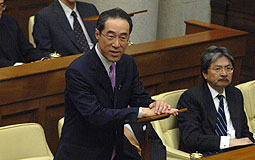
|
| Towards universal suffrage: Chief Secretary Henry Tang unveils the Green Paper on Constitutional Development at the Legislative Council meeting. |
The Government has published a Green Paper on Constitutional Development to consult the public on the models, roadmap and timetable for electing the Chief Executive and for forming the Legislative Council by universal suffrage.
Unveiling the document at the Legislative Council meeting this afternoon, Chief Secretary for Administration Henry Tang said the paper has been prepared on the basis of the Commission on Strategic Development's discussions and those within the community in the past 20 months.
"All proposals received are covered by the Green Paper. At this stage, the HKSAR Government has not formed any specific views on the way forward or ruled out any options," he added.
Regarding the models for electing the Chief Executive by universal suffrage, the document pointed out that people must consider three key issues - composition and size of the nominating committee, method of nomination, and method for selecting the Chief Executive by universal suffrage following nomination.
Nominating committee
On the composition and size of the nominating committee, the paper has categorised the relevant proposals as three types of options:
* having the 60 LegCo members form the nominating committee;
* modelling the nominating committee on the existing Election Committee, with the size of the nominating committee set at 800 members; and
* modelling the nominating committee on the Election Committee, but with membership expanded to 1200-1600.
Regarding the nomination method, any option must comply with Article 45 of the Basic Law that Chief Executive candidates are "nominated by the nominating committee in accordance with democratic procedures".
The document presents the options relating to the method of nomination on the basis of the number of candidates available after nominations by the nominating committee. The three types of options are:
* 10 candidates or more;
* eight candidates at most; and
* two to four candidates at most.
The document also covers other issues relating to the method of nomination, including whether an upper limit should be set on the number of subscribers which a Chief Executive candidate can obtain, and whether a candidate should be required to obtain a certain number of nominations from each sector or from some specified sectors of the nominating committee.
One person, one vote
As for the method of universal suffrage after nomination, the community generally acknowledges that after the candidates' nomination, the Chief Executive should be elected by universal suffrage on the basis of "one person, one vote", Mr Tang said.
Other related issues that need to be considered include whether one or more election rounds should be held after nomination, and whether the election proceedings should continue if there is only one candidate.
Regarding the model for implementing universal suffrage for LegCo, the paper has offered three types of options:
* replacing functional constituency seats with district-based seats returned through direct election;
* retaining functional constituency seats, but changing the electoral method; and
* increasing the number of seats representing District Councils in LegCo, and having all LegCo seats be returned either through direct or indirect elections.
The paper also covers the proposals relating to attaining universal suffrage for LegCo in phases, for example, there are suggestions that functional constituency seats can be abolished in three phases.
Roadmap, timetable
Regarding the roadmap and timetable for implementing universal suffrage for CE, the three types of options are:
* forming the nominating committee directly in 2012 to attain universal suffrage;
* going through a transitional phase and attaining universal suffrage in 2017; and
* going through a transitional phase and attaining universal suffrage after 2017.
Regarding the roadmap and timetable for implementing universal suffrage for LegCo, the three types of options are:
* attaining universal suffrage in one go in 2012;
* attaining universal suffrage in phases by 2016; and
* attaining universal suffrage in phases after 2016.
In the discussion of the roadmap and timetable for implementing universal suffrage, the document also addresses whether universal suffrage for the Chief Executive should precede that for LegCo - as some have proposed.
The Government will conduct a three-month public consultation to garner people's views. It will also listen to the views of LegCo Members, District Council members, individuals of different sectors and strata, as well as district personalities through meetings and public forums.
After the consultation exercise, the Government will summarise the views received and assess whether a mainstream view could be formed as the basis for taking forward the work to the next phase. The Chief Executive will submit a report to the Central Authorities to reflect any mainstream views formed during the public consultation and other views expressed.
Accommodating attitude
Mr Tang called upon political parties and groups, as well as different quarters of our community to keep an open mind and be accommodating.
"We hope that the issue of universal suffrage can be resolved in a satisfactory manner, which would be conducive to the progressive development of Hong Kong's political environment. We cannot afford to allow the issue of universal suffrage to polarise the community any longer.
"It is only through rational and pragmatic public discourse that we can forge consensus on the future constitutional development of Hong Kong."
The consultation will run until October 10. For details of the document, click here. All views should be sent to the Constitutional & Mainland Affairs Bureau by post to 3/F, Main Wing, Central Government Offices, Lower Albert Road, Hong Kong; by fax to 2523 3207, or by email to views@cmab-gpcd.gov.hk.
|